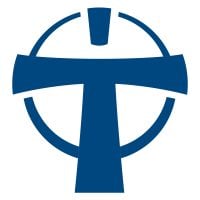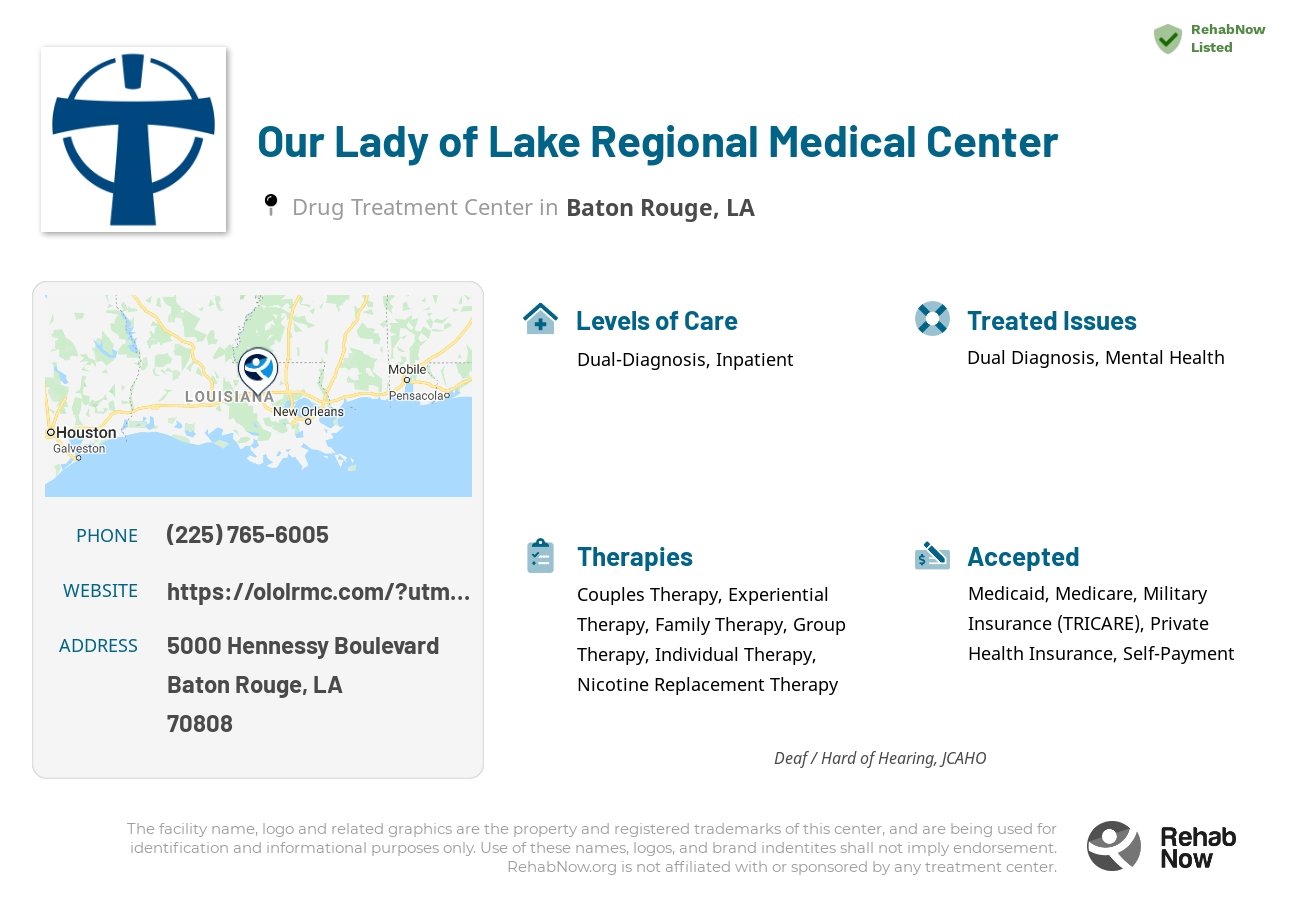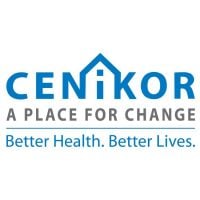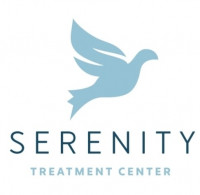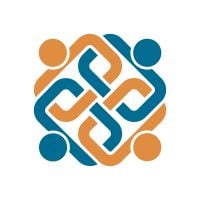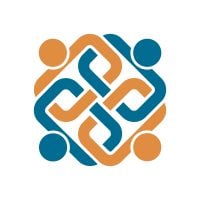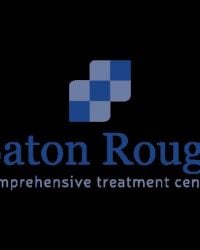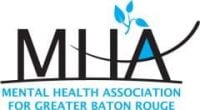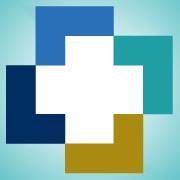Our Lady of Lake Regional Medical Center
Drug Rehab Center in Baton Rouge, Louisiana
Our Lady of the Lake Regional Medical Center in Baton Rouge, Louisiana is a highly respected hospital that provides comprehensive medical services, including a comprehensive addiction and substance abuse program, offering individualized, multidisciplinary treatment plans that consider individual needs and goals.
About This Louisiana Facility
Our Lady of the Lake Regional Medical Center in Baton Rouge, Louisiana is a highly respected hospital that provides medical services to the people of Louisiana. It is a full-service medical facility with a Level 1 trauma center that offers comprehensive care and advanced medical technology. Our Lady of the Lake Regional Medical Center also offers many services related to mental health and addiction, including a comprehensive addiction and substance abuse program.
The addiction and substance abuse program at Our Lady of the Lake Regional Medical Center offers an individualized, multidisciplinary approach to treating addiction. This includes assessments, medical services, psychological counseling, medication-assisted treatment, and aftercare. Clinicians at Our Lady of the Lake Regional Medical Center consider individual needs and goals to create a customized treatment plan that is tailored to the client's needs. The facility also provides educational and support groups to assist individuals in recovery.
Our Lady of the Lake Regional Medical Center is accredited by The Joint Commission, licensed by the Department of Health and approved by the Louisiana Department of Health Office of Behavioral Health. In addition, the facility has earned recognition from the National Association of Addiction Treatment Providers for its commitment to providing quality and comprehensive care for individuals with addiction and substance use disorders. Our Lady of the Lake Regional Medical Center also offers a variety of support groups, including family and friends of those struggling with addiction, as well as spiritual and 12-step based recovery groups.
Genders
Ages
Modality
Additional
Accreditations

JCAHO
Conditions and Issues Treated
When addiction and psychiatric issues co-occur, the addict’s recovery is more successful when both conditions are treated. A dual diagnosis refers to a condition in which the patient is diagnosed with two health issues: addiction and bipolar disorder.
Usually, dual diagnosis sufferers are prescribed a combination of treatments for each condition. The most common therapies are psychotherapy, behavioral therapy, spiritual counseling, 12-step programs, and medication management.
Psychiatric conditions are an obstacle to recovery because they can create roadblocks to a healthy lifestyle. Drugs and alcohol may be used as a means of self-medication, which can have dangerous consequences. Over time, addicts build up a tolerance and suffer withdrawal symptoms when drug use is stopped.
With the proper treatment, dual diagnosis sufferers can overcome their conditions and achieve lasting sobriety.
Levels of Care Offered at Our Lady of Lake Regional Medical Center
This center offers a variety of custom treatment tailored to individual recovery. Currently available are Dual-Diagnosis, Inpatient, with additional therapies available as listed below.
Inpatient treatment is an option that provides addicts with a supportive environment in which they can stop using. This type of intensive care and supervision is appropriate for those who were unable to quit on their own or need more structure than they could get from outpatient treatment, such as the addict most in need of this level of care.
The goal of inpatient rehab is for the addict to stay focused on sobriety and remain free of mood altering substances. Inpatient treatment programs usually offer the following: detox, therapy groups, one-on-one counseling, medication management and aftercare planning.
Therapies & Programs
Individual therapy is a critical component of addiction recovery. It allows the patients to go deep into their core issues and discover how to handle those problems better. Therapy can be conducted in individual sessions as well as group settings. In individual therapy for addiction, the patient meets with their therapist one-on-one to focus on the underlying issues. This allows patients to open up and discuss personal topics they may not feel comfortable discussing in a group setting. This type of therapy can help develop solutions specific to each patient, which helps speed up the recovery process.
Couples therapy is beneficial for couples in which at least one partner has a substance use disorder. This type of therapy can help partners improve communication skills, which is an important factor in a healthy relationship. It can also help partners better understand one another so they have a greater understanding of how the other partner may be feeling.
Benefits of couples therapy include:
- Improvement in communication skills
- Increased understanding of the dynamics within a relationship
- Increased sense of support and trust in the relationship
- Better teamwork between partners/increased willingness to listen and work together
- Enhanced tolerance of each other’s shortcomings
- Improved ability to have open, honest communication with each other
Family therapy is a crucial part of drug treatment and getting sober. It is one of the most effective ways to help addicts stay on the path to long-term sobriety. When a drug addict decides that they want to try and get sober, it takes the support of every person they love to succeed. It can be incredibly difficult for loved ones to watch an addict go through the pain and suffering of withdrawal, but by being there with them and supporting them, they can help to make sure that the addiction never returns.
One of the most important parts of family therapy is the relapse prevention plan. During treatment, therapists and doctors will often sit down with the addict and their family to develop a plan in case the addict ever feels like they want to use again. This plan should involve steps the addict and family can take together to prevent them from relapsing in the future. An addict’s family can play a vital part in helping them to avoid relapse because they can spot the warning signs and help them get back on track before it becomes too much of a problem.
Group therapy helps prevent addicts from feeling isolated or unique in their situation by offering a sense of comfort and fellowship. It also creates a forum for addicts to build their support systems and learn from each other. The group therapy sessions at Our Lady of Lake Regional Medical Center occur in a group setting rather than one-on-one to create a safer, controlled environment where addicts feel comfortable.
Cognitive Behavioral Therapy (CBT) is a common therapeutic approach to help drug addicts. It teaches addicts new ways of thinking and behaving so that they can avoid relapse. There are several forms of CBT used in drug rehabilitation centers.
Cognitive Restructuring helps addicts identify faulty, negative thinking so that they can work together with the therapist to find healthier ways of thinking, resulting in better decision-making.
Cognitive Behavioral Therapy for Addiction uses the principles of CBT to help treat addiction. It focuses on specific aspects of each person’s thinking, feeling, physiology, and behavior. It aims to identify specific problems in these areas and create a personalized treatment strategy.
Patient Experience
Experiential Therapy at Our Lady of Lake Regional Medical Center
Experiential Therapy is a new approach to addiction treatment. Addiction-related psychological issues like depression and anxiety are addressed through physical activities.
Experiential Therapy can help those who have struggled with past traumas or life decisions like drug use. It allows people to gain new perspectives on their behavior patterns by recreating experiences in healthy ways rather than continuing old habits that may no longer serve them well.
Payment Options Accepted
For specific insurance or payment methods please contact us.
Is your insurance accepted?
Ask an expert, call (888) 674-0062
Additional Details
Specifics, location, and helpful extra information.
Baton Rouge, Louisiana 70808 Phone Number(225) 765-6005 Meta DetailsUpdated November 25, 2023
Staff Verified
Patient Reviews
There are no reviews yet. Be the first one to write one.
Baton Rouge, Louisiana Addiction Information
Louisiana is one of the top ten states in the nation for opioid-related deaths. One in ten high school students admits to regularly using prescription opioids for non-medical purposes. More than 225,000 Louisiana residents admit to regular heavy drinking and around 6% of the Louisiana population abuses alcohol. Marijuana use in Louisiana is most common amongst teenagers between the ages of 12 and 17 years old.
Opioid overdoses are on the rise in Baton Rouge and throughout Louisiana. In 2019, opioid fatalities in Louisiana rose by 25%. In 2018, there were 1,140 drug overdose deaths in Louisiana; 40% involved opioids. Methamphetamine is involved in 20% of drug relapse treatment admissions in Baton Rouge, Louisiana. There are several drug treatment programs available through Baton Rouge including medication-assisted therapy and detoxification
Treatment in Nearby Cities
- Marrero, LA (69.6 mi.)
- Sulphur, LA (136.0 mi.)
- Ruston, LA (172.1 mi.)
- Broussard, LA (54.0 mi.)
- Abita Springs, LA (64.0 mi.)
Centers near Our Lady of Lake Regional Medical Center
The facility name, logo and brand are the property and registered trademarks of Our Lady of Lake Regional Medical Center, and are being used for identification and informational purposes only. Use of these names, logos and brands shall not imply endorsement. RehabNow.org is not affiliated with or sponsored by Our Lady of Lake Regional Medical Center.
